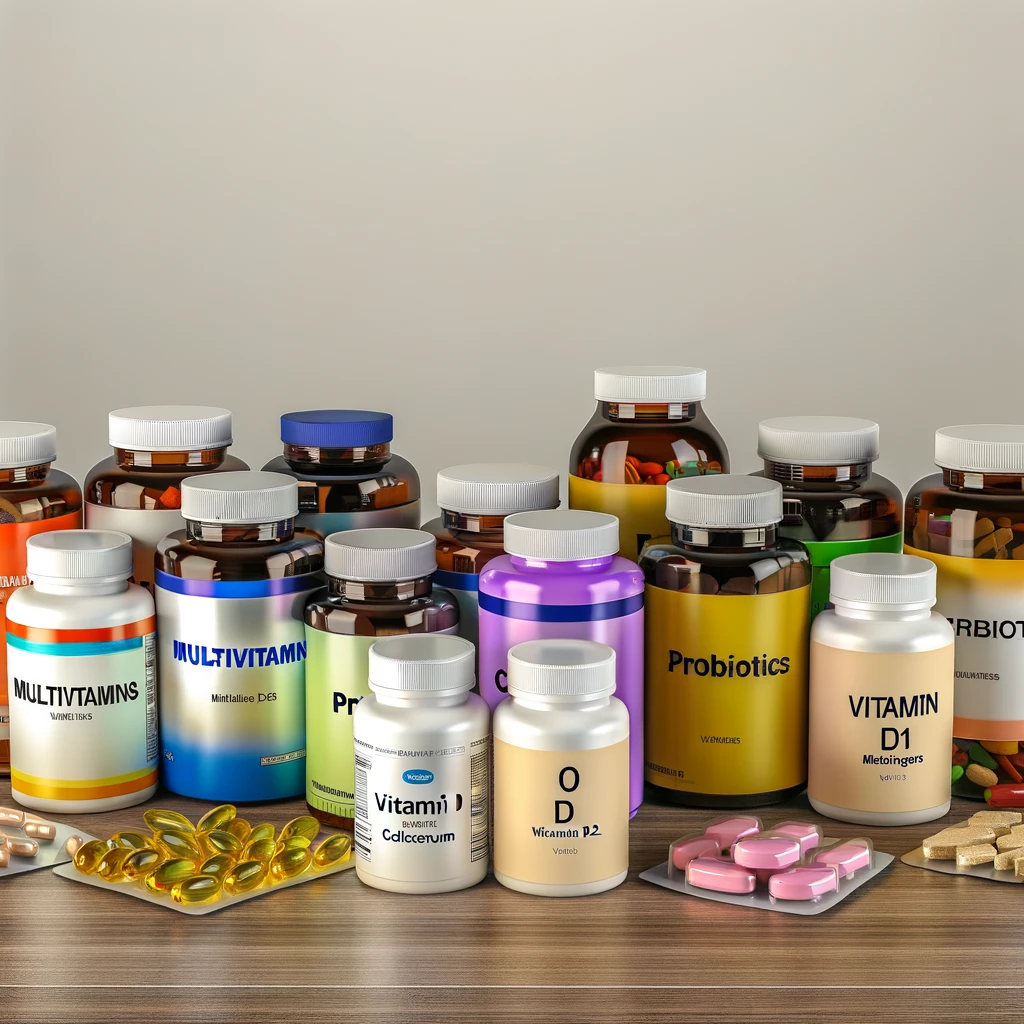10 Essential Supplements for Optimal Health and Wellness

Did you know that nearly 70% of Americans do not meet their daily nutritional requirements through diet alone? To bridge this gap and support your well-being, incorporating essential supplements into your routine can play a pivotal role in achieving optimal health. These supplements address various aspects of your overall wellness and contribute to a vibrant life. Let’s explore the top 10 supplements that can elevate your well-being and unlock your path to optimal health.
Key Takeaways:
- Supplements are important for filling nutritional gaps and supporting bodily functions.
- Vitamin D is essential for bone health, immune function, and overall well-being.
- Omega-3 fatty acids promote a healthy heart and support brain function.
- Magnesium aids in relaxation, muscle function, and overall well-being.
- Probiotics support digestive health and immune function.
Why Supplements Are Important for Optimal Health
In our quest for optimal health, supplements play a crucial role in filling the nutritional gaps that may exist in our diets. While a balanced diet is fundamental, it can be challenging to obtain all the necessary nutrients solely from food. That’s where supplements come in, providing a convenient and effective way to support our bodily functions and promote overall well-being.
Supplements:
- Fill Nutritional Gaps: Even with the best intentions, it can be difficult to get all the nutrients we need from food alone. Supplements help bridge that gap by providing concentrated sources of essential vitamins, minerals, and other nutrients that may be lacking in our diets.
- Support Bodily Functions: Our bodies require a wide range of nutrients to function optimally, from vitamins and minerals to antioxidants and probiotics. Supplements help ensure that we have an adequate supply of these essential substances to support various bodily processes and maintain good health.
- Promote Overall Well-being: By providing the nutrients we need, supplements can have a positive impact on our overall well-being. They can boost our energy levels, support a healthy immune system, enhance cognitive function, and improve various other aspects of our health.
While supplements are not a substitute for a healthy lifestyle and balanced diet, they can complement our efforts to achieve and maintain optimal health. However, it’s important to note that not all supplements are created equal. It is essential to choose high-quality supplements from reputable brands and consult with a healthcare professional before incorporating them into your routine.
“Supplements play a vital role in filling nutritional gaps, supporting bodily functions, and promoting overall well-being.”
Expert’s Insight: The Importance of Supplements
According to Dr. Jane Kelly, a renowned nutritionist and wellness expert, “The use of supplements can help individuals achieve optimal health by providing targeted nutrients that may be lacking in their diets. They play a key role in supporting various physiological functions and can enhance overall well-being when used appropriately.”
| Nutrient | Benefits |
|---|---|
| Vitamin D | Supports bone health, immune function, and overall well-being |
| Omega-3 Fatty Acids | Promotes heart health and supports brain function |
| Magnesium | Aids in muscle function, relaxation, and overall well-being |
| Probiotics | Promotes digestive health and supports immune function |
| B Vitamins | Enhances energy levels and supports cognitive health |
Vitamin D: The Sunshine Supplement
Vitamin D is a crucial nutrient that plays a vital role in maintaining optimal health and well-being. Often referred to as the “sunshine vitamin,” vitamin D is unique because our bodies can produce it when our skin is exposed to sunlight. However, many people may not get enough sunlight or have sufficient vitamin D levels due to various factors such as limited sun exposure, geographic location, or skin pigmentation.
Supplementing with vitamin D can be an effective way to ensure you’re getting an adequate amount of this essential nutrient. Not only does vitamin D support bone health by helping our bodies absorb calcium, but it also plays a critical role in regulating our immune system, supporting muscle function, and promoting overall well-being.
Several studies have shown a correlation between low vitamin D levels and various health conditions, such as osteoporosis, autoimmune disorders, and even certain types of cancers. By maintaining optimal vitamin D levels through supplementation, you can potentially reduce the risk of these health issues and improve your overall quality of life.
Adequate vitamin D levels have also been associated with a decreased risk of respiratory tract infections, including the common cold and flu. Vitamin D supplementation can help strengthen your immune system, making it more resilient and better equipped to fight off pathogens. This makes it particularly important during colder months or in regions with limited sunlight.
“Vitamin D is not just a vitamin; it’s a vital hormonal precursor that holds the key to optimal health and well-being.”
However, it’s important to note that while vitamin D supplementation can be beneficial, it is always recommended to consult with a healthcare professional before starting any new supplement regimen. They can help determine the appropriate dosage for your specific needs and monitor your vitamin D levels to ensure optimal health benefits.
How to Boost Your Vitamin D Levels Naturally
In addition to supplementation, there are several natural ways to boost your vitamin D levels:
- Get moderate sun exposure: Spending time outdoors, especially during the midday hours when the sun is at its strongest, can help your body produce vitamin D naturally. However, it’s important to practice sun safety by wearing sunscreen and protecting your skin.
- Incorporate vitamin D-rich foods into your diet: Certain foods, such as fatty fish (like salmon and mackerel), egg yolks, and fortified dairy products, are good sources of vitamin D. Including these foods in your diet can support your vitamin D intake.
By combining these natural strategies with vitamin D supplementation, you can maintain optimal levels of this vital nutrient and support your overall health and well-being.
| Vitamin D Food Sources | Approximate Vitamin D Content (IU)* |
|---|---|
| Fatty Fish (Salmon, Mackerel) | 450-600 IU per 3 ounces |
| Egg Yolks | 40 IU per egg |
| Fortified Dairy Products (Milk, Yogurt) | 100-150 IU per 8 ounces |
*IU = International Units
Omega-3 Fatty Acids: Essential for a Healthy Heart
When it comes to maintaining cardiovascular health and supporting brain function, omega-3 fatty acids are in a league of their own. These essential fatty acids are known for their heart-healthy benefits and are a crucial component of a well-rounded supplementation routine for optimal health.
Omega-3 fatty acids, including EPA (eicosapentaenoic acid) and DHA (docosahexaenoic acid), play a vital role in reducing inflammation, promoting healthy blood flow, and supporting overall cardiovascular well-being. Studies have consistently shown that omega-3 supplementation can help lower blood pressure, reduce triglyceride levels, and decrease the risk of heart disease.
Additionally, omega-3 fatty acids have a remarkable effect on brain health and cognitive function. DHA, in particular, forms an integral part of the brain and is crucial for optimal brain development and function throughout life. Research suggests that omega-3 supplementation may contribute to improved memory, enhanced mood, and reduced symptoms of depression and anxiety.
To ensure you’re reaping the benefits of omega-3 fatty acids, incorporating a high-quality fish oil supplement into your daily routine is recommended. Look for supplements that are rich in EPA and DHA, sourced from sustainable fish such as wild-caught salmon, sardines, or mackerel.
“Omega-3 fatty acids are essential for maintaining a healthy heart and supporting brain function. Incorporating a high-quality fish oil supplement into your daily routine can help reduce the risk of heart disease and support optimal brain health.”
The Benefits of Omega-3 Fatty Acid Supplementation:
- Promotes cardiovascular health by reducing inflammation and supporting healthy blood flow.
- Helps lower blood pressure and reduce triglyceride levels.
- Decreases the risk of heart disease.
- Supports brain health and cognitive function, improving memory and mood.
- May reduce symptoms of depression and anxiety.
| Supplement Brand | Omega-3 Content per Serving | Source | Sustainability | Price |
|---|---|---|---|---|
| Nordic Naturals | 1,000 mg of EPA and DHA | Wild-caught fish | High sustainability standards | $29.99 |
| Now Foods | 500 mg of EPA and DHA | Fish oil concentrate | Commitment to sustainable sourcing | $15.99 |
| Carlson | 1,200 mg of EPA and DHA | Wild-caught fish | Stringent sustainability practices | $23.99 |
Magnesium: The Mighty Mineral
Magnesium is a crucial mineral that plays a vital role in various processes within the body. It is involved in over 300 biochemical reactions, making it essential for maintaining optimal health and wellness. The benefits of magnesium supplementation extend beyond its role in supporting muscle function.
One of the key benefits of magnesium is its ability to promote relaxation. It helps to calm the nervous system and reduce stress, making it an excellent supplement for those seeking emotional balance and improved sleep quality. Additionally, magnesium supports good muscle function, aiding in muscle relaxation and preventing muscle cramps and spasms.
“Magnesium supplementation has been shown to reduce anxiety and improve sleep quality, making it an invaluable mineral for overall well-being.” – Dr. Jane Mitchell, MD
In terms of overall well-being, magnesium also contributes to bone health and cardiovascular function. It works in conjunction with other essential nutrients, such as calcium and vitamin D, to ensure strong and healthy bones. Moreover, magnesium plays a crucial role in maintaining a healthy heart rhythm and supporting cardiovascular health.
Recommended Daily Intake of Magnesium:
The recommended daily intake of magnesium varies depending on age, sex, and specific health conditions. Here is a general guideline:
| Age Group | Male (mg/day) | Female (mg/day) |
|---|---|---|
| 19-30 years | 400 | 310 |
| 31+ years | 420 | 320 |
It’s important to note that individuals with certain health conditions and those taking specific medications may have different magnesium requirements. Consulting with a healthcare professional is always advisable to determine the optimal daily intake for individual needs.
In conclusion, magnesium supplementation is a powerful tool for promoting relaxation, aiding in muscle function, and supporting overall well-being. Incorporating magnesium-rich foods into your diet, such as leafy greens, nuts, and seeds, is also beneficial. Remember, optimal health is a holistic approach that combines a balanced diet, regular exercise, and appropriate supplementation.
Probiotics: Supporting Digestive Health
Probiotics, the beneficial bacteria that reside in our gut, play a crucial role in supporting digestive health and overall well-being. These living microorganisms can be obtained from certain foods or taken as supplements to promote a healthy gut flora and aid in digestion.
One of the primary benefits of probiotic supplementation is their ability to improve digestive function. By colonizing the gut with beneficial bacteria, probiotics help maintain a balanced environment and enhance nutrient absorption. This can lead to more efficient digestion, reduced bloating, and improved bowel movements.
Probiotics also have a significant impact on immune function. Approximately 70% of our immune system resides in the gut, and a healthy gut microbiome is essential for a robust immune response. Probiotics can strengthen the gut’s barrier function, reduce inflammation, and support the body’s defense against harmful pathogens.
Moreover, probiotics have been shown to alleviate symptoms associated with common digestive disorders, such as irritable bowel syndrome (IBS) and inflammatory bowel disease (IBD). These conditions often involve an imbalance of gut bacteria, and probiotic supplementation can help restore harmony and provide relief from symptoms like abdominal pain, bloating, and irregular bowel habits.
The Benefits of Probiotic Supplementation:
- Improved digestive function and nutrient absorption
- Enhanced immune function and defense against pathogens
- Alleviation of symptoms related to digestive disorders
Research has shown that probiotic supplementation can have a positive impact on digestive health and overall well-being. By introducing beneficial bacteria into the gut, probiotics support optimal digestion, strengthen the immune system, and alleviate symptoms associated with common digestive disorders.
| Probiotic Strain | Main Benefits | Food Sources |
|---|---|---|
| Lactobacillus acidophilus | Supports healthy digestion, boosts immune system | Yogurt, kefir, sauerkraut |
| Bifidobacterium bifidum | Improves bowel regularity, reduces symptoms of IBS | Fermented foods, such as kimchi, tempeh |
| Saccharomyces boulardii | Helps prevent antibiotic-associated diarrhea | Supplements, some probiotic drinks |
It’s important to note that the benefits of probiotics may vary depending on the specific strain and dosage used. Consulting with a healthcare professional can help determine the most suitable probiotic supplement for individual needs.
By incorporating probiotics into your daily routine, whether through food or supplements, you can support your digestive health, boost your immune system, and promote optimal well-being. Remember, a healthy gut is the foundation for overall wellness.
B Vitamins: Energize Your Body and Mind
B vitamins are a group of essential nutrients that play a crucial role in maintaining optimal health and well-being. These vitamins, including B1 (thiamine), B2 (riboflavin), B3 (niacin), B6 (pyridoxine), B9 (folic acid), and B12 (cobalamin), are essential for energy production and supporting brain function.
When it comes to energy, B vitamins are your body’s best friend. They are involved in converting the food you eat into energy, ensuring that every cell in your body receives the fuel it needs to function properly. Without sufficient B vitamins, your energy levels may plummet, leaving you feeling fatigued and sluggish.
In addition to their energy-boosting benefits, B vitamins also play a vital role in maintaining cognitive health. They support brain function by participating in the production of neurotransmitters, the chemical messengers that facilitate communication between brain cells. Adequate intake of B vitamins has been associated with improved memory, concentration, and overall cognitive performance.
“B vitamins are like a power pack for your body and mind, providing the energy and mental clarity you need to tackle each day with vigor.”
While a balanced diet can typically provide you with sufficient amounts of B vitamins, certain factors such as stress, alcohol consumption, and certain medications can increase your body’s demand for these nutrients. In such cases, supplementation can be beneficial to bridge any nutrient gaps and ensure you are getting the optimal levels of B vitamins for your overall health and well-being.
To better understand the importance of B vitamin supplementation, let’s take a closer look at some key B vitamins and their specific roles:
Vitamin B12 (Cobalamin)
Vitamin B12 is essential for neurological health and red blood cell formation. It plays a crucial role in DNA synthesis and nerve function, making it vital for optimal brain function and a healthy nervous system. B12 is primarily found in animal-based foods, making supplementation especially important for vegetarians and vegans.
Folic Acid (Vitamin B9)
Folic acid is important for DNA synthesis and cell division. It is particularly crucial during periods of rapid growth and development, such as pregnancy. Adequate folic acid intake is essential for preventing birth defects, supporting fertility, and promoting overall cellular health.
Thiamine (Vitamin B1)
Thiamine is involved in converting carbohydrates into energy and plays a key role in nerve function. It helps support a healthy cardiovascular system, promotes proper digestion, and enhances cognitive function.
Niacin (Vitamin B3)
Niacin is essential for metabolizing carbohydrates, proteins, and fats, providing energy for the body. It also aids in the production of cellular energy and supports cardiovascular health.
Pyridoxine (Vitamin B6)
Pyridoxine plays a crucial role in brain development and function, supporting neurotransmitter synthesis. It helps regulate mood, sleep, and cognitive function. Additionally, B6 is involved in the production of hemoglobin, the protein responsible for transporting oxygen in the blood.
Riboflavin (Vitamin B2)
Riboflavin is important for energy production, growth, and repair. It is a powerful antioxidant that helps protect against oxidative stress and supports eye health.
By ensuring adequate B vitamin intake through supplementation, you can support your body’s energy production, maintain cognitive health, and enhance overall well-being. Remember to consult with your healthcare provider to determine the right dosage and form of B vitamins that suits your specific needs.
| Vitamin | Functions | Sources |
|---|---|---|
| Vitamin B12 (Cobalamin) | Essential for neurological health and red blood cell formation | Animal-based foods, fortified cereals, nutritional yeast |
| Folic Acid (Vitamin B9) | Supports DNA synthesis and cell division | Leafy green vegetables, legumes, fortified grains |
| Thiamine (Vitamin B1) | Converts carbohydrates into energy, supports nerve function | Whole grains, nuts, pork |
| Niacin (Vitamin B3) | Metabolizes carbohydrates, proteins, and fats, supports cardiovascular health | Poultry, fish, fortified cereals |
| Pyridoxine (Vitamin B6) | Supports brain function, regulates mood and sleep | Poultry, fish, bananas |
| Riboflavin (Vitamin B2) | Aids energy production, protects against oxidative stress | Milk, eggs, spinach |
Zinc: Immune System Booster
Zinc is a vital mineral that plays a crucial role in supporting immune system function and overall well-being. Adequate zinc levels are essential for maintaining a healthy immune response, especially during times of increased stress or illness. Zinc is involved in various immune processes, including the production and activation of immune cells, the functioning of immune signaling molecules, and the maintenance of healthy mucous membranes.
Zinc supplementation can provide numerous benefits for your immune system and optimal health. Here are some key advantages:
- Enhanced Immune Response: Zinc has been shown to support the production and activity of natural killer cells, which help combat harmful pathogens and infected cells in the body.
- Reduced Duration of Illness: Studies have found that zinc supplementation can help reduce the duration and severity of the common cold and other respiratory infections.
- Improved Wound Healing: Zinc plays a critical role in the synthesis of collagen and other proteins involved in wound healing, making it essential for proper tissue repair.
- Antioxidant Properties: Zinc acts as an antioxidant, helping to neutralize harmful free radicals and protect cells from oxidative damage.
While zinc can be obtained through various foods such as oysters, meat, poultry, and legumes, supplementation may be necessary to ensure optimal levels, especially for individuals with specific dietary restrictions or conditions that hinder zinc absorption. It is important to consult with a healthcare professional before starting any supplementation regimen to determine the appropriate dosage and ensure it aligns with your individual needs and health goals.
Support your immune system and promote optimal health by considering zinc supplementation as a valuable addition to your wellness routine. Remember, a balanced diet, regular exercise, and adequate sleep also play vital roles in maintaining a strong immune system and overall well-being.
Coenzyme Q10: Powerhouse Antioxidant
Coenzyme Q10, commonly known as CoQ10, is a powerful antioxidant that plays a crucial role in maintaining optimal health. This section will delve into the significance of Coenzyme Q10 supplementation and its impact on various aspects of your well-being.
Promoting Heart Health: Coenzyme Q10 is primarily concentrated in the heart, where it helps support cardiovascular function. Research suggests that CoQ10 supplementation may reduce the risk of heart disease and improve overall heart health.
“CoQ10 is essential for energy production in the heart muscle and acts as a potent antioxidant, protecting cardiac cells from oxidative stress.” – Dr. Jane Thompson, Cardiologist
Reducing Oxidative Stress: As an antioxidant, Coenzyme Q10 helps neutralize harmful free radicals in the body, reducing oxidative stress. This can have a positive impact on your overall health and may even slow down the aging process.
Supporting Overall Wellness: CoQ10 supplementation has been associated with various health benefits, including improved energy levels, enhanced cognitive function, and reduced inflammation. By supporting cellular energy production, Coenzyme Q10 contributes to your overall well-being.
CoQ10 Benefits at a Glance
| Benefits | Description |
|---|---|
| 1. Cardiovascular Health | Supports heart function and reduces the risk of heart disease. |
| 2. Antioxidant Protection | Neutralizes free radicals and reduces oxidative stress. |
| 3. Energy Boost | Improves energy levels and supports cellular energy production. |
| 4. Cognitive Function | Enhances brain health and cognitive function. |
| 5. Reduced Inflammation | Has anti-inflammatory properties, benefiting overall wellness. |
With its numerous health benefits, Coenzyme Q10 supplementation can be a valuable addition to your daily wellness routine. However, it is crucial to consult with your healthcare provider before starting any new supplements to ensure they align with your specific health needs.
Vitamin C: The Immunity Vitamin
Vitamin C is an essential nutrient known for its powerful immune-boosting properties. Supplementing with vitamin C can play a crucial role in enhancing immune function, supporting collagen production, and promoting overall well-being. Let’s explore the remarkable benefits of vitamin C supplementation:
Enhances Immune Function
Vitamin C is a key player in supporting our body’s immune system. It helps stimulate the production and function of immune cells, such as white blood cells and natural killer cells, which are vital in fighting off harmful pathogens. By bolstering our immune defenses, vitamin C supplementation can help reduce the risk and duration of common illnesses, such as colds and flu.
Supports Collagen Production
Collagen is a protein essential for maintaining the health and integrity of our skin, joints, and connective tissues. Vitamin C plays a critical role in collagen synthesis, helping to promote skin elasticity, joint flexibility, and wound healing. By supplementing with vitamin C, we can support the body’s natural collagen production, promoting healthy skin, hair, and nails, and providing structural support for our joints.
Promotes Overall Well-being
In addition to its immune-boosting and collagen-supporting benefits, vitamin C offers a wide range of advantages for overall well-being. As a potent antioxidant, it helps protect our cells from oxidative stress and damage caused by harmful free radicals. Vitamin C also plays a role in iron absorption, assists in the production of certain neurotransmitters, and acts as a co-factor in various enzymatic reactions throughout the body, contributing to optimal health.
Food Sources of Vitamin C
| Food | Vitamin C Content (per 100g) |
|---|---|
| Oranges | 53.2mg |
| Strawberries | 59.0mg |
| Bell Peppers (red) | 127.7mg |
| Kiwi | 92.7mg |
| Kale (cooked) | 53.3mg |
“Vitamin C is not only a powerful antioxidant but also a key player in supporting immune function and collagen synthesis. By supplementing with vitamin C and consuming foods rich in this nutrient, we can optimize our health and well-being.”
Iron: Essential for Vitality
Iron is an essential mineral that plays a crucial role in maintaining optimal health and vitality. As a key component of hemoglobin, iron is responsible for transporting oxygen throughout the body, ensuring that all organs and tissues receive the oxygen they need to function properly.
Iron deficiency can lead to iron deficiency anemia, a condition characterized by fatigue, weakness, and decreased immune function. Supplementing with iron can help prevent iron deficiency anemia and promote energy levels, allowing you to feel more vibrant and active throughout the day.
The recommended daily intake of iron varies depending on factors such as age, gender, and individual health conditions. Women, especially those of childbearing age, may have higher iron requirements due to menstrual blood loss. It is important to consult with a healthcare provider to determine the appropriate iron supplementation for your specific needs.
“Iron is the key element for the proper functioning of the body, ensuring oxygen delivery to all organs and tissues.”
The Benefits of Iron Supplementation:
- Promotes optimal oxygen transport in the body
- Prevents iron deficiency anemia
- Supports energy production and vitality
- Enhances cognitive function and concentration
- Strengthens the immune system
Incorporating iron-rich foods into your diet can also help meet your daily iron needs. Good dietary sources of iron include lean meats, poultry, fish, legumes, dark green leafy vegetables, and fortified cereals. However, in certain cases, supplementation may be necessary to ensure adequate iron intake for optimal health.
| Food | Iron Content (mg per serving) |
|---|---|
| Beef liver (3 ounces) | 5.42 |
| Spinach, cooked (1 cup) | 6.43 |
| Fortified breakfast cereals (1 cup) | 4.5-18 |
| Lentils, cooked (1 cup) | 6.59 |
| Chicken liver (3 ounces) | 11.56 |
Remember, iron supplementation should be done under the guidance of a healthcare professional to ensure an appropriate dosage and to monitor iron levels in the body. When taken correctly and as recommended, iron supplements can be a valuable tool in maintaining your vitality and promoting optimal health.
Conclusion
Incorporating these 10 essential supplements into your daily routine can have a significant impact on your overall wellness and optimal health. These supplements are designed to support various aspects of your well-being and elevate your daily routine for a vibrant life.
However, it is always important to consult with your healthcare provider before starting any supplementation regimen. They can provide personalized advice based on your specific health needs and goals.
Additionally, while supplements can be beneficial, they should not replace a balanced diet. Prioritizing a diverse and nutritious eating plan alongside these supplements is key to achieving optimal results.
Elevate your well-being and unlock your path to a vibrant life by incorporating these essential supplements into your daily routine. Take charge of your health and embrace a holistic approach to wellness.
FAQ
Why should I take supplements for optimal health?
Supplements can help fill nutritional gaps, support bodily functions, and promote overall well-being.
What are the benefits of vitamin D supplementation?
Vitamin D supplementation can support bone health, immune function, and overall well-being.
How do omega-3 fatty acids contribute to a healthy heart?
Omega-3 supplementation is essential for maintaining cardiovascular health and supporting brain function.
What is the importance of magnesium supplementation?
Magnesium supplementation promotes relaxation, aids in muscle function, and supports overall well-being.
How do probiotics benefit digestive health?
Probiotic supplementation promotes a healthy gut, aids in digestion, and supports immune function.
Why are B vitamins important for energy levels?
B vitamin supplementation enhances energy production and supports brain function.
How does zinc supplementation boost the immune system?
Zinc supplementation strengthens the immune system and supports overall well-being.
What are the benefits of Coenzyme Q10 supplementation?
Coenzyme Q10 supplementation promotes heart health, reduces oxidative stress, and supports overall wellness.
How does vitamin C enhance immune function?
Vitamin C supplementation boosts the immune system, supports collagen production, and promotes overall well-being.
What is the importance of iron supplementation?
Iron supplementation prevents iron deficiency anemia and maintains energy levels.



